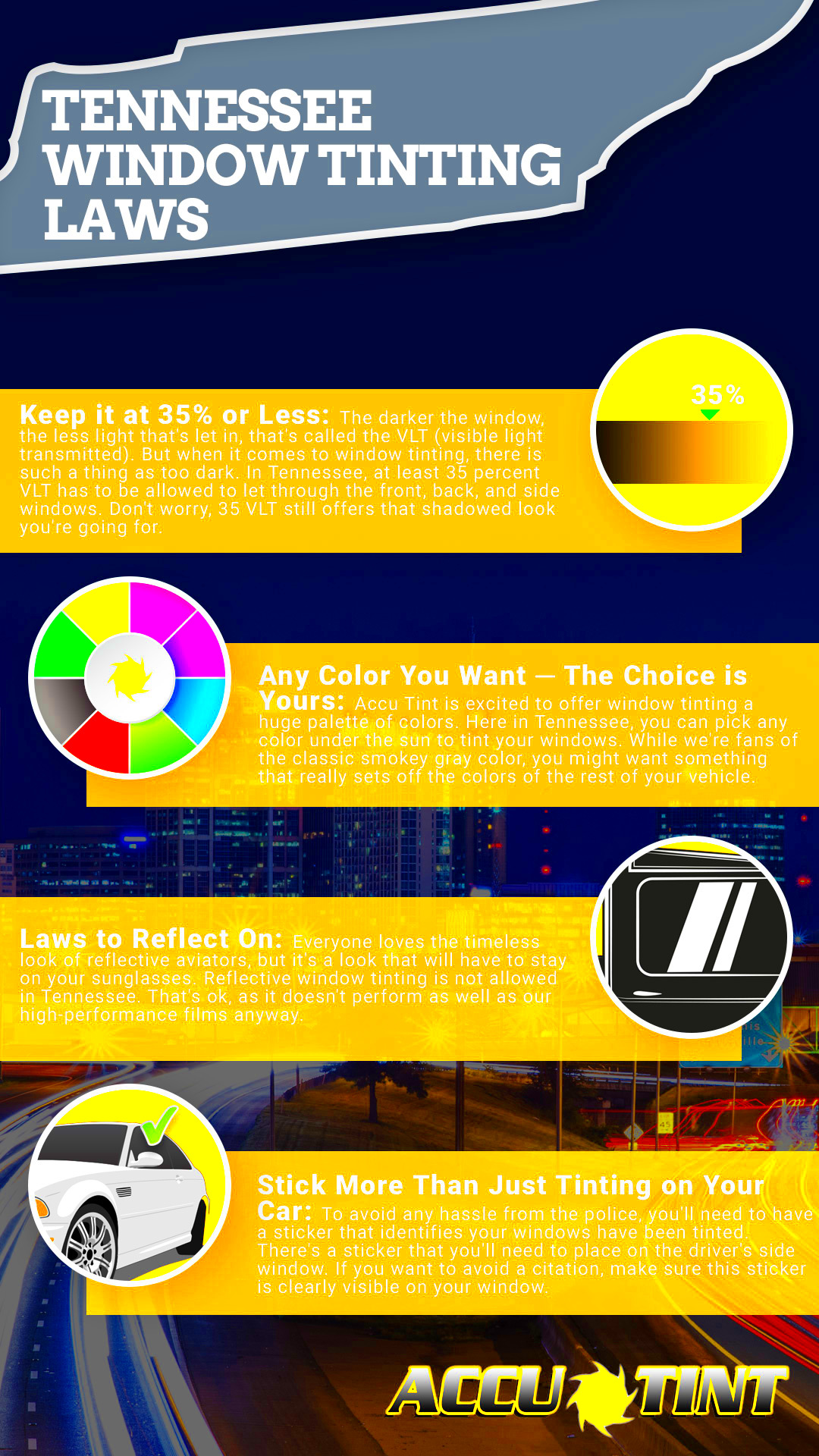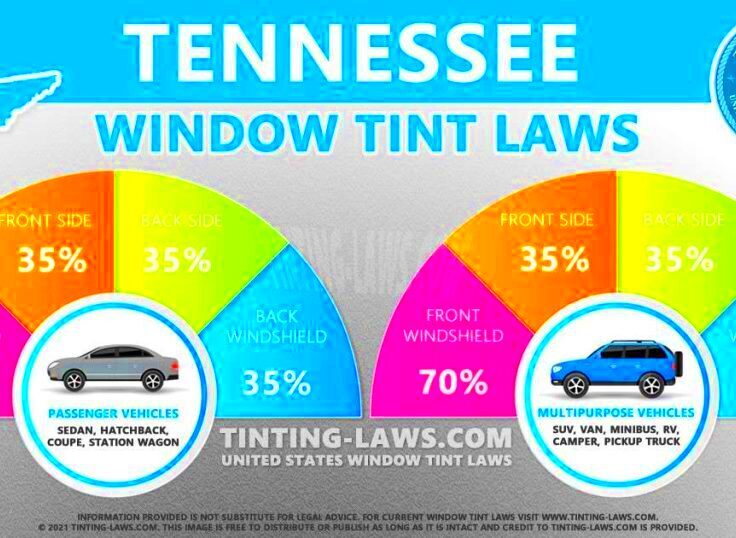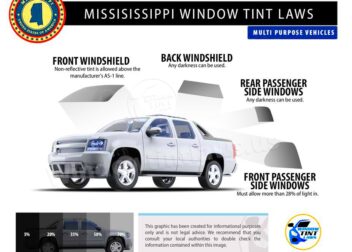A Comprehensive Overview of Tennessee Tint Laws in 2023
Tennessee has specific laws regarding window tinting that vehicle owners must follow. These laws are designed to ensure safety on the roads while allowing some degree of privacy and comfort for drivers and passengers. Understanding these laws is crucial for anyone considering tinting their vehicle windows. This post will explore the various regulations, types of tints available, and tips for compliance.
Understanding Window Tinting Regulations

Window tinting regulations in Tennessee are based on the Visible Light Transmission (VLT) percentage. VLT refers to the amount of light that passes through the window. The lower the VLT percentage, the darker the tint. Here’s a quick overview of what you need to know:
- Front Windshield: Must allow more than 70% of light in. Tint can only be applied to the top 5 inches.
- Front Side Windows: Must allow more than 35% of light in.
- Back Side Windows: No restrictions on darkness.
- Rear Window: No restrictions on darkness.
These rules help law enforcement see inside the vehicle, especially during traffic stops. Make sure to check for any updates or changes to these regulations.
Types of Window Tint Available in Tennessee
When it comes to window tint, there are several types to choose from, each with its own benefits. Understanding these can help you select the right option for your vehicle:
| Type of Tint | Description | Benefits |
|---|---|---|
| Dyed Window Tint | This tint uses a dye to block sunlight. | Great for aesthetic appeal and privacy. |
| Metalized Window Tint | Contains small metallic particles that reflect heat. | Excellent heat reduction and durability. |
| Ceramic Window Tint | Uses advanced technology to block UV rays and heat. | Offers high performance without darkening the windows excessively. |
| Carbon Window Tint | Contains carbon particles to provide a matte finish. | Good heat rejection and does not fade over time. |
Choosing the right type of tint can make a significant difference in comfort and style. Always consult with a professional to ensure you select a tint that meets Tennessee’s legal requirements.
Legal Tint Percentages for Different Vehicle Windows
When it comes to window tinting in Tennessee, knowing the legal tint percentages for each type of vehicle window is essential. These percentages determine how much light can pass through your windows, and there are specific rules for different windows of your vehicle. Here’s a breakdown of what is allowed:
| Window Type | Legal VLT Percentage | Notes |
|---|---|---|
| Front Windshield | More than 70% | Tint can only be applied to the top 5 inches. |
| Front Side Windows | More than 35% | This ensures visibility for law enforcement. |
| Back Side Windows | No restrictions | You can go as dark as you like. |
| Rear Window | No restrictions | Perfect for total privacy if desired. |
Adhering to these tint percentages is crucial. Not only does it keep you compliant with the law, but it also helps ensure safety for yourself and others on the road. If you’re unsure about your tint, it’s always best to consult a professional installer.
Medical Exemptions for Window Tinting
In Tennessee, there are provisions for individuals who require darker window tints for medical reasons. If you have a medical condition that necessitates a specific level of protection from sunlight, you may qualify for an exemption. Here’s how it works:
- Documentation Required: You will need a signed letter from a licensed physician stating your medical condition and the need for darker tint.
- Application Process: You must submit this documentation to the Department of Safety and Homeland Security.
- Specific Tint Levels: Once approved, you may be allowed to have tint levels darker than the legal limits.
These exemptions are designed to help individuals who genuinely need extra protection from harmful UV rays or glare. Always ensure you keep the necessary documentation in your vehicle to avoid issues with law enforcement.
Consequences of Violating Tint Laws
Failing to comply with Tennessee’s tint laws can lead to various penalties. It’s essential to understand the potential consequences to avoid unnecessary trouble. Here are some of the common repercussions:
- Fines: You may face fines ranging from $100 to $200 for each violation. The amount can increase with repeated offenses.
- Vehicle Inspection: Law enforcement may require your vehicle to be inspected to determine the legality of the tint.
- Removal of Tint: In some cases, you may be ordered to remove the illegal tint, which can be an added cost.
- Points on Your License: Repeated violations can result in points being added to your driving record.
To avoid these consequences, always ensure your vehicle’s window tint adheres to the legal limits. It’s worth taking the time to understand and comply with these laws for your safety and peace of mind.
Tips for Ensuring Compliance with Tint Laws
Staying compliant with Tennessee’s tint laws doesn’t have to be a headache. Here are some straightforward tips to help you ensure that your window tinting meets the legal requirements:
- Know the Rules: Familiarize yourself with the specific VLT percentages allowed for different windows in your vehicle. This will help you avoid any surprises.
- Choose a Reputable Installer: Work with a professional who understands Tennessee’s tint laws. They can guide you in selecting the right product and applying it correctly.
- Ask for Certification: Make sure your installer provides a certificate of compliance that verifies the tint meets legal standards. Keep this document in your vehicle.
- Test Your Tint: Consider using a light meter to check the VLT of your windows after installation. This can help confirm that you’re within the legal limits.
- Keep Up with Changes: Laws can change, so it’s essential to stay updated on any new regulations that may affect window tinting.
By following these tips, you can enjoy the benefits of window tint while remaining on the right side of the law.
Resources for Further Information
If you want to dive deeper into Tennessee’s tint laws or need assistance, there are several resources available. Here are some helpful places to check:
- Tennessee Department of Safety and Homeland Security: Their official website provides up-to-date information on vehicle regulations, including window tint laws.
- Local Law Enforcement Agencies: Don’t hesitate to reach out to your local police department or sheriff’s office for guidance on tint laws in your area.
- Window Tinting Associations: Groups like the International Window Film Association (IWFA) offer resources and can connect you with certified installers.
- Automotive Forums: Online communities often share experiences and advice about legal tinting, which can be valuable.
Using these resources, you can gain a better understanding of the laws and ensure you’re compliant while enjoying your tinted windows.
Frequently Asked Questions
Many people have questions about Tennessee’s tint laws. Here are some of the most common ones, along with their answers:
- Can I get a ticket for having too dark of a tint?
Yes, law enforcement can issue fines for non-compliance with tint laws. It’s important to know the legal limits. - Are there any exemptions for drivers with medical conditions?
Yes, you can apply for a medical exemption if you have a condition that requires darker tint. - Can I tint my windshield?
You can apply a tint to the top 5 inches of your windshield, but the rest must allow more than 70% light transmission. - How can I check if my tint is legal?
You can use a light meter to measure the VLT or consult a professional tint installer for assistance. - What should I do if I get pulled over for tint violations?
Stay calm, comply with the officer’s requests, and be prepared to show any documentation related to your tint.
Having answers to these questions can help you feel more confident about navigating Tennessee’s window tint laws.
Conclusion on Tennessee Tint Laws
Understanding and adhering to Tennessee’s tint laws is essential for vehicle owners who want to enhance their driving experience while staying compliant with the law. By familiarizing yourself with the legal tint percentages for different windows, exploring the types of tint available, and knowing the consequences of violations, you can make informed decisions. Additionally, taking advantage of medical exemptions and following practical tips for compliance can ensure you avoid unnecessary fines and complications. Remember, a little research and preparation go a long way in enjoying the benefits of window tinting while keeping your vehicle within legal limits. Stay informed, stay compliant, and enjoy your ride!


